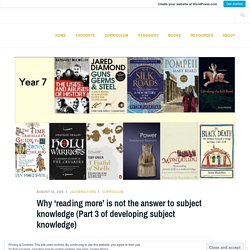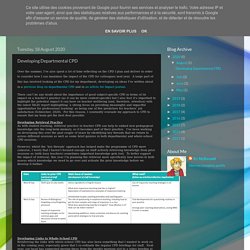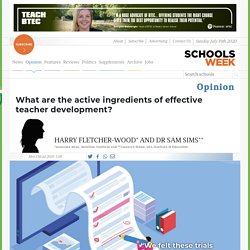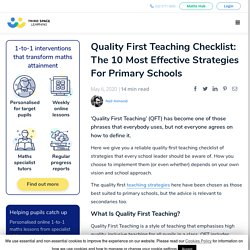

Why ‘reading more’ is not the answer to subject knowledge (Part 3 of developing subject knowledge) – The Frozen Sea. Recently there has been much discussion about developing subject knowledge.

This series of posts explores why it matters, and my thinking about how to develop subject knowledge in my department. The first post outlines why it is important for developing curriculum, the second is the principles that are guiding my thinking. This post uses these reflections to evaluate different approaches that I have seen advocated recently. Subject knowledge has not always been a priority for schools in teacher development.
This problem stems from changes to the ITT model as John Howsam has shown in his analysis of the Clark review in the 1990s Kenneth Clarke cut time in teacher training to allow more time in schools. This focuses on strategies to develop the knowledge of history. Approach 1: Read more history books This is a commonly advocated strategy to developing subject knowledge. “Giles had us reading books on a frequent basis and then using these to design our schemes of work. Issue 1: Time. Developing Departmental CPD. Over the summer, I’ve also spent a lot of time reflecting on the CPD I plan and deliver in order to consider how I can maximise the impact of the CPD for colleagues next year.

A large part of this has involved looking at the CPD for my department, developing on ideas I’ve written about in a previous blog on departmental CPD and in an article for Impact journal. There can’t be any doubt about the importance of good subject-specific CPD in terms of its impact on a teacher’s practice (as it can be more context-specific) but I also feel it’s important to highlight the potential impact it can have on teacher wellbeing (and, therefore, retention) with the latest TALIS report highlighting ‘a strong focus on providing meaningful and impactful opportunities for professional learning’ as being one of five predictors for teachers’ job satisfaction (Schleicher, 2020). For this reason, I constantly evaluate my approach to CPD to ensure that my team get the best deal possible. Evaluating the Process. The active ingredients of effective teacher development. Our research shows the consensus view of how best to conduct effective professional development in education is flawed, write Sam Sims and Harry Fletcher-Wood Effective and sustained professional development is collaborative, subject-specific and practice-based, and should be supported by external expertise and teachers’ buy-in.

So goes the consensus view of the research community. But in a recently published article in School Effectiveness and School Improvement, we question the evidence underpinning this consensus. We began our investigation when we came across examples of professional development that included all these features, but didn’t seem to improve student learning. We wondered why, and dug into the evidence underpinning the claims. We worked our way back to an early, influential review, but found it was based on just a handful of professional development trials. Additionally, reviewers had looked for the features these trials had in common. Moodle. ‘Quality First Teaching’ (QFT) has become one of those phrases that everybody uses, but not everyone agrees on how to define it.

Here we give you a reliable quality first teaching checklist of strategies that every school leader should be aware of. How you choose to implement them (or even whether) depends on your own vision and school approach. The quality first teaching strategies here have been chosen as those best suited to primary schools, but the advice is relevant to secondaries too. What Is Quality First Teaching?
Quality First Teaching is a style of teaching that emphasises high quality, inclusive teaching for all pupils in a class. QFT has existed in one form or another since 2010. The History of QFT Those who have been in the profession for some time or trained circa 2010 may know that the phrase ‘quality first teaching’ first appeared in several documents published by the then Department for Children, Schools and Families.
The National Strategies Intervention. ZilLearn. Research-Rich Pedagogies. Rosendale Action Research. What Experienced Teachers can Learn from NQTs. Research Support Partnership - Evidence Based Education. Whether you are an individual school, a group or alliance, or a local authority, after a Research Support Partnership, you will: have a team of trained Research Leads, with the in-house capacity for ongoing innovation and evidence-based practice;be able to make better-informed decisions, rather than going on hunches or sales pitches;learn to conduct small-scale evaluations of interventions.

We chose to implement something, so did it work? And should we continue it? Perhaps most importantly, stop doing things that don’t work. Why waste time on interventions that you can demonstrate don’t work in your context? Whatever the format, our programmes are in line with the best evidence on CPD in schools. What’s more, you will get access to our years of expertise in teaching, school leadership, government policy-making, evaluating, and RCT research.
Request training - Catch Up. Request training - Catch Up.